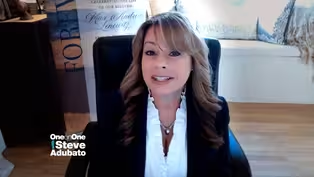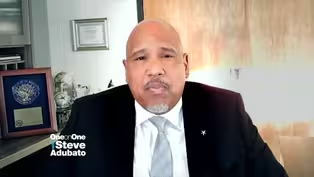One-on-One
Sustainability Challenges Facing The Garden State
Clip: Season 2024 Episode 2704 | 8m 23sVideo has Closed Captions
Sustainability Challenges Facing The Garden State
Steve Adubato sits down with Amy Tuininga, Ph.D., Director of PSEG Institute for Sustainability Studies at Montclair State University, to address sustainability challenges in the Garden State, community gardens, and applying sustainability principles to various industries.
Problems playing video? | Closed Captioning Feedback
Problems playing video? | Closed Captioning Feedback
One-on-One is a local public television program presented by NJ PBS
One-on-One
Sustainability Challenges Facing The Garden State
Clip: Season 2024 Episode 2704 | 8m 23sVideo has Closed Captions
Steve Adubato sits down with Amy Tuininga, Ph.D., Director of PSEG Institute for Sustainability Studies at Montclair State University, to address sustainability challenges in the Garden State, community gardens, and applying sustainability principles to various industries.
Problems playing video? | Closed Captioning Feedback
How to Watch One-on-One
One-on-One is available to stream on pbs.org and the free PBS App, available on iPhone, Apple TV, Android TV, Android smartphones, Amazon Fire TV, Amazon Fire Tablet, Roku, Samsung Smart TV, and Vizio.
Providing Support for PBS.org
Learn Moreabout PBS online sponsorship(upbeat music) - We're now joined by Dr. Amy Tuininga, who's the Director of the PSEG Institute for Sustainability Studies at my alma mater, Montclair State University.
Doctor, good to see you.
- Thank you, it's nice to see you as well.
- Tell everyone what the institute is because its impact is important now more than ever.
- Well, the PSEG Institute for Sustainability Studies has been around, it preceded me, but I came in 2016 and we built out the Green Teams program that serves corporations, communities, and students partnering together to solve sustainability issues.
- This whole Green Teams thing.
When I was reading about it, I thought, who's on the Green Team and what impact are they having?
- Huge impact.
So students come from all over the country and outside of the country, 90 different colleges and universities and 135 degree programs.
We put 'em on teams of five and they are partnered up with corporations or nonprofits to solve some of their own sustainability challenges.
Everything from emissions to water, waste, and some food kinds of issues as well.
- Amy, connect the work that's being done at Montclair State at this institute, with the larger crisis of climate change.
- Yeah, I mean, the work that we do is local and regional, but it impacts global systems.
The weather systems that are operating globally that feed back for crises that we see in our neighborhoods.
So the flooding that we see in the streets in Hoboken and Hackensack, and we're able to implement mitigation strategies like green infrastructure in Hackensack to reduce flooding from two feet down to like a quarter of an inch.
- So it's interesting because I don't wanna, whoever believes in, doesn't believe in climate change being real, that that's your business.
It's real.
That's not editorializing, it's science.
But I wanna be clear.
The work that's being done is impacting people's lives in very tangible ways.
And I'm gonna get to a couple of other things.
The community garden.
How is the community garden that you're involved in connected to sustainability, and what does that have to do with climate issues, please?
- Right, so climate is changing the way that crops can grow and the pests that are there and the fungi that are affecting the crops.
We connect with technology and students and faculty to come in and grow fresh vegetables.
Hundreds and hundreds of pounds are going into our food pantry, the Red Hawk food pantry on campus.
About 40% of our students, 41%, are food insecure.
So they don't have enough to eat on a regular basis.
They go hungry.
These fresh vegetables go into the food pantry and they could come and access them anytime.
So we're taking these global challenges, studying them from a scientific perspective, and making resources available at a local level.
- Amy, I wanna follow up on this.
The students at Montclair State, and having been around Montclair State and taught there and being connected to the university for many years, I know that for many of the students, in their families, they're often the first in their family to go to a higher ed institution.
But for the work that you are doing at the institute, this is the first generation of students involved in these kinds of activities around sustainability, climate change, et cetera.
What impact does that potentially have, not just on those students, but on the work that they will do moving forward?
- It's huge.
So we're all about belonging and purpose, right?
And so we build this inclusive culture that helps people to feel like they belong.
That boosts their confidence.
By working in a team with other people, they realize, oh, what I'm learning in my math class is applicable in the real world, and this is where I go for a job.
Because they don't, if you're first generation, you don't necessarily have a role model that's doing the kind of career you wanna go into.
So they're able to build social capital, is what we call it, but it's a network, right?
And so if you have family members that are working in all the kinds of companies you wanna work in, you have that social capital, you have that network.
But so for these students, it's like a springboard.
It helps them to see what they would actually be doing.
And it's different than just a regular internship.
We've moved away from apprenticeships, but really for first generation college students, you need an apprenticeship in a corporate kind of job.
And that's what this is.
It's a bridge into those careers.
- Real quick on this, Doctor, what kinds of jobs are we talking about?
- So, these are 135 different majors that these students have come from.
And so it's everything from accounting and finance to communications to STEM, engineering, physics, math, the humanities, writers.
And they're going into jobs at EY and Deloitte and Accenture.
So some of the big companies, but also locally in government in the New Jersey Department of Environmental Protection or the Environmental Defense Fund.
They're also working for Bureau of Public Utilities and Municipalities and nonprofits.
So it's a huge range of jobs that the students are going into.
Some of it in the environment, the environmental sector as consultants, but some of it in a regular finance position.
But now they're able to include sustainability.
- As I'm listening to Amy and thinking about this, it's funny.
People say things like, oh, someone's in the environmental field or the field of sustainability as it relates to climate change.
But the reality is, and Amy knows this better than I ever could, is that there is no job, there is no industry, there is no field that you can be involved professionally that does not...
There are banks that we interact with that are involved in sustainability initiatives, climate change initiatives, trying to make a contribution.
You can't get away from this.
And so it seems to me that what the institute is doing is embracing that reality.
Real quick before I let you go, Amy, you're so passionate and committed to this work because?
- It's the future, right?
So last summer when we saw those orange clouds passing through, we've been talking about this happening for decades.
It's here, we can't breathe.
We want future generations to have a healthy life and environment.
And they need a job to be able to address those issues.
So this is how to connect all of those dots.
- Dr. Amy Tuininga is the Director of the PSEG Institute for Sustainability Studies at Montclair State University.
Amy, great to have you with us.
Thanks so much.
- Thank you very much, I appreciate it.
- You got it.
We'll be right back, right after this.
- [Narrator] One on One with Steve Adubato is a production of the Caucus Educational Corporation.
Celebrating 30 years in public broadcasting.
Funding has been provided by Horizon Blue Cross Blue Shield of New Jersey.
PSEG Foundation.
PSE&G, New Jersey Sharing Network.
The Fidelco Group.
New Jersey’s Clean Energy program.
Englewood Health.
PNC Foundation.
And by The Adler Aphasia Center.
Promotional support provided by BestofNJ.com.
And by ROI-NJ.
- Hi, I'm Abbie.
You might see me as an ordinary person, but I've been living with a brain injury since 2018.
Opportunity Project gave me hope and I've gained confidence through job skill training and helping my family.
Despite my challenges with memory, I see a possibility to keep improving.
- [Narrator] If you have a brain injury, you don't have to face your road to recovery alone.
Learn more about Opportunity Project and its partnership with Children's Specialized Hospital.
The Extreme Dangers of Fentanyl Poisoning
Video has Closed Captions
Clip: S2024 Ep2704 | 11m 45s | The Extreme Dangers of Fentanyl Poisoning (11m 45s)
Setbacks due to COVID at Technology High School
Video has Closed Captions
Clip: S2024 Ep2704 | 8m 24s | Setbacks due to COVID at Technology High School (8m 24s)
Providing Support for PBS.org
Learn Moreabout PBS online sponsorship
- News and Public Affairs

Top journalists deliver compelling original analysis of the hour's headlines.

- News and Public Affairs

FRONTLINE is investigative journalism that questions, explains and changes our world.












Support for PBS provided by:
One-on-One is a local public television program presented by NJ PBS

